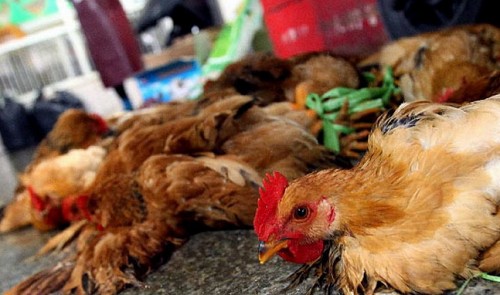As the H7N9 bird flu in China has spread to areas bordering Vietnam, the Ministry of Agriculture and Rural Development has ordered the halting of poultry imports via the northern border under any form.
>> USAID offers $800,000 for fighting epidemics in VN>> Health agency warns about bird flu in humans >> Ministry warns about risk of H7N9 virus spread>> First human death from H5N1 flu in VN this year The ban was announced by Minister Cao Duc Phat at an urgent meeting held by his ministry on Thursday with other concerned agencies, including Ministries of Public Security, and Industry and Trade, and the Border Guard High Command, to discuss measures to prevent the spread of the H7N9 flu as well as those to be applied in case the epidemic affects the country. At the meeting, Pham Van Dong, head of the ministry’s Veterinary Department warned that the H7N9 epidemic in China has spread to many regions bordering Vietnam, including Guang Xi, where three people have been infected with the deadly H7N9 virus. Guang Xi borders four provinces of Vietnam, so the country is facing a high risk of an epidemic spread, Dong said. From the beginning of this year, 130 people in China have contracted the H7N9 virus and 31 of them have died, according to Chinese health authorities.
Although the H7N9 virus has yet to be detected in Vietnam, effective measures should be taken to prevent it, Dong said. In order to prevent the H7N9 penetration, Minister Cao Duc Phat decided “to absolutely ban importing poultry via the [northern] border under any form.” He added that “this is a difficult task to do, but it can be fulfilled with a strong determination.” High mortality rate
The H7N9 flu transmits from birds to humans and causes a high mortality rate. Having the same ways of transmission of the H5N1, the H7N9 virus is often found at poultry trading areas with poor hygienic conditions, the Veterinary Department said.
“The H7N9 virus is very fatal. The virus can be transmitted rapidly through many ways, and for every four people who have contracted it, one has died,” Minister Cao Duc Phat warned.
In addition, unlike H5N1, the H7N9 virus transmits quietly among herds of poultry without leaving clear epidemic signs, so its appearance is hard to be discovered, the minister said.
This means poultry contracting the virus can show no clinical symptoms, so testing poultry samples must be carried out regularly for early detection, he added.
In a related development, 30-year-old Huynh Thanh Tuan, a man of Khanh Hoa Province who contracted the H1N1 flu, died at 5 pm Thursday after nine days of treatment at the Khanh Hoa Province General Hospital.
Tuan’s samples were tested by the Ho Chi Minh City Pasteur Institute and the Nha Trang City Pasteur Institute, which both confirmed Tuan had contracted the H1N1 virus, a human seasonal flu virus that is also endemic in pigs (swine influenza) and in birds (avian influenza).






















































